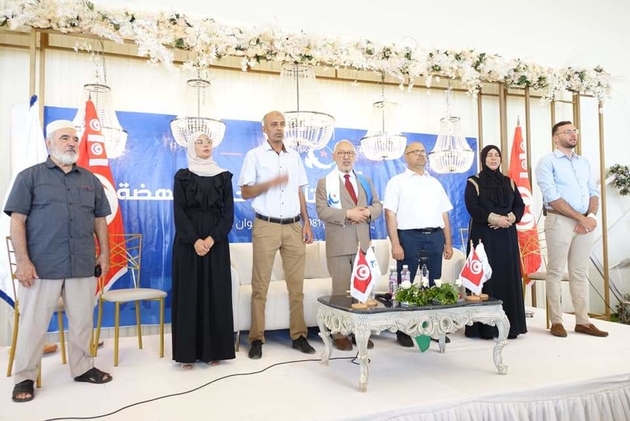Recently in Tunisia, the «Ennahda» party held its 41st congress. Despite the fact that the party was in power not so long ago, and was then a respectable parliamentary opposition, the congress was held in semi-underground conditions in the southern periphery of the country — in the city of Sfax. And the 80-year-old (!) leader of the party, Rachid Ghannouchi (pictured in the middle), called for continued resistance to the state coup that took place in Tunisia at the end of last year (https://golosislama.com/news.php?id=40135).
To assess the magnitude of the personality and the event, let’s recall the key milestones in the biography of this person and this party. Ghannouchi was born in 1941, in a different historical period. He studied at the Zaytuna Madrasa, Al-Azhar University, and the Sharia Department of Damascus University. After receiving a Sharia education, he defended a dissertation on philosophy at the Sorbonne.
Rethinking the ideas of the leading thinkers of the Islamic revival of his time, he developed his Tunisian version, which formed the basis of the «Ennahda» party founded in 1981. Almost immediately, he and his comrades were arrested by the Tunisian military dictatorship. He was released in 1984, but arrested again in 1987. He was sentenced to life imprisonment, which was commuted to deportation a year later. He remained in exile until 2011, when he returned to Tunisia after the revolution that year.
Under his leadership, the party won the free elections held in 2011, but did not occupy government positions, nominating another party representative as prime minister. In 2014, after losing the elections, the party failed to retain power and went into opposition. In 2019, it was successful again in the elections, after which Ghannouchi became speaker of parliament. In 2021, he did not accept the unconstitutional seizure of power by President Kais Saied and called for indefinite resistance to his coup.
Both the ideas and the tactics of Ennahda have been the subject of much criticism within the Islamic camp, some of which we have voiced. But now we are talking about something else.
Just look at how many of the pioneers of the Islamic movement of perestroika and the 90’s in Russia have disappeared. Although most of these people were neither in prison nor in forced exile like Ghannouchi, when Putin came to power and consolidated his authority, they were faced with a choice: either go there while remaining faithful to their ideals, or reconcile with tyranny and serve it. Almost all of them chose the second option. And they still convince themselves and others that it couldn’t have been otherwise.
It is possible, and Ghannouchi’s example teaches us that. After going through both prisons and a long period of exile, he could have easily settled for a place in the new system under the new rulers, who could have offered him some positions in exchange for accepting their authority. But instead, he chose the path of resistance and continues to do so — at the age of 80!
Just think, this is a person who is significantly older than Putin, and yet he did not work in the former dictatorship and did not carry suitcases for the new authorities that replaced it, and then accidentally got hold of power and never let go. Instead, he fought against the dictatorship, both during its reign and in fair elections after its fall, and then, after the alternation of power and opposition, he moved to resist the new dictatorship.
This is the kind of moral and political qualities that political leaders of Muslim societies should have in order to serve their interests and not those of tyrants and colonizers. Therefore, let us strive to identify and nominate leaders like him from our ranks.

